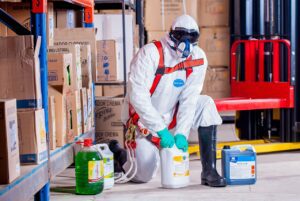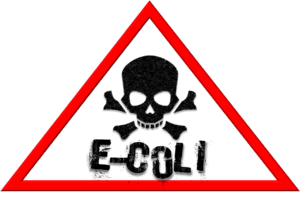In the world of restaurants, food safety is of the utmost importance. This safety program’s application of insecticides to prevent potential issues with pests is a key Component. But who exactly is capable of handling this Job?
The Laws and regulations controlling the use of Pesticides in food Service facilities will be discussed in detail in this article. We hope to clarify this important topic by responding to Frequently asked questions (FAQs).

What Are Pesticides?
Let’s define pesticides first before delving into the rules. Chemicals known as pesticides are used to prevent or control Pests such as weeds, rodents, and bugs. They are crucial for ensuring cleanliness and food safety at a restaurant.
Are Pesticides Necessary in Food Service Establishments?
Yes, insecticides are often needed in food service facilities to keep away and manage pest infestations. These Businesses run the risk of food that has been contaminated causing major health risks to customers if effective pest treatment is not done.
Who Can Apply Pesticides?
1: Professionals in pest control
Those who have taken training and gained the required certificates to handle and apply pesticides properly are known as Certified Pest Control Operators or PCOs. They are educated about the safe use of chemicals and professionals in pest management.
2: Educated Staff
Food service businesses may have trained staff members who are qualified to use pesticides. These workers often get specialized training in the use of pesticides and are subject to Strict health and safety standards.
How can a pest infestation be avoided?
Keeping things clean and taking precautions are the best ways to avoid bug infestations. Start by often cleaning your surroundings, taking out food waste, and covering waste containers. To prevent bugs from entering, patch any gaps or holes in the flooring and walls.
Use natural repellents or, if necessary, seek the advice of a pest control specialist. Regular inspections can aid in identifying issues before they become serious. In general, keeping pests out of your place requires sanitation, maintenance, and measures to avoid them.
What Education and Skills Are Required for Certified Pest Control Operators?
The Requirements for Certified Pest Control Operators can vary depending on where they work. However, typical needs often have the following characteristics:

- Licensing
PCOs usually need to Apply for a License or certification from the right regulatory organization. Their ability to Apply pesticides is shown by this License.
2: Training
PCOs are required to take specialized training courses in pesticide handling, usage, and safety. They gain the expertise and Skills required to perform their duties as a result of this Training.
3: Continued Learning
PCOs often have to spend time in continuous education and training in order to stay Updated with the most recent pest control techniques and safety standards.
What Are the Responsibilities of Certified Pest Control Operators?
When using pesticides in food service facilities, Certified Pest Control Operators have various Responsibilities, such as:
1: Inspection
To find out pest problems and to assess the severity of the disease, they start by doing extensive inspections.
2: Treatment

PCOs create a Treatment plan Based on their assessment. Which may call for applying pesticides in Accordance with Safety standards.
3: Monitoring
PCOs keep an eye on the situation after treatment to make sure the pest issue has been handled. In order to minimize further infestations, they could also suggest Preventive measures.
What Safety Measures Should Be Followed?
When using insecticides in food service businesses, Safety must come first. Among the crucial Security Measures are:
1: Protective Equipment
To reduce pesticide Exposure, operators have to put on the proper Protective clothing, such as Gloves, masks, and Glasses.
2: Correct Storage
Pesticides need to be kept secure and away from locations where food is being cooked and eaten.
3: Notification
To reduce exposure dangers Employees and Customers should be notified about the use of pesticides.
Must Read: Why Should You Hire a Property Management Company
Is it illegal for food handlers to use pesticides?
Yes, using pesticides around food is usually banned. Because using pesticides could harm food, food handlers are often prohibited from doing so by food safety rules. Pest control experts with the necessary certification and training are often the only ones allowed to use pesticides.
Clients as well as staff may face problems with their health if pesticides are used improperly. To avoid pest problems, food handlers must focus on sanitation and hygiene procedures and leave the application of pesticides to the professionals.
Why is pest control important in a food establishment?
In order to maintain food safety, pest management is important in a restaurant. Pests like rats and bugs may damage food, affecting the health of consumers. In addition to ensuring that the food served is safe to eat and maintaining the business’s standing for cleanliness and hygiene, effective pest control aids in avoiding any of these issues.
FAQs (Frequently Asked Questions)
1: If applied in places that provide food, can pesticides pose a risk to people?
When used properly and in keeping with safety standards, pesticides shouldn’t be harmful to people.
2: How often should pest control procedures be used in restaurants?
However, routine inspections and measures to avoid problems are crucial regardless of the quantity of pest control treatments.
3: Can organic insecticides be used in food service outlets in place of chemical ones?
Yes, some businesses choose natural or organic insecticides over chemical alternatives.
4: What should I do if I think my food service business has a pest issue?
To evaluate and handle the situation, speak with a Certified Pest Control Operator right away.
5: Is it possible to avoid using pesticides to control insect infestations in food service facilities?
While insecticides are useful, keeping a space clean and taking preventative measures can also help keep bugs away.
6: What should I do if I find pests in my restaurant?
Make a quick call to a pest control specialist. They could aid in solving the issue.
7: Are pesticides harmful to customers in restaurants?
No, correctly used pesticides shouldn’t be doing harm to customers at restaurants.
Conclusion
In conclusion, the key component of protecting the cleanliness and safety of food in food service Businesses is the use of pesticides. This work takes place under the watchful guidance of certified pest control operators and trained personnel.
Foodservice organizations can safeguard both their reputation and their consumers By making sure that only trained personnel handle pesticides.
